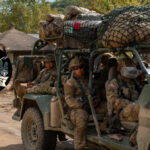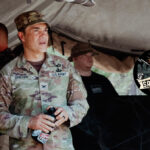
It’s time once again to feature some of the smart conversations that occur around the country through the Eisenhower Series College Program. For over 50 years, the Eisenhower Program has reached out to colleges and town halls across the nation to introduce War College students to audiences that are often unfamiliar with members of the U.S. military. This episode features Don Mozer and Luis Peral as they examine the current efforts of the U.S. military support to the ongoing drug interdiction mission of the nation. With the benefit of Don’s recent tour in NORTHCOM and Luis’s decades of law enforcement and prosecutorial experience between them, they share their perspectives with podcast host Ron Granieri. Their conversation aims to understand the nature of a very real threat to national security as well as consider possible strategies to combat that threat in the present and well into the future.
I looked at what I call the unholy trinity, and that is production, distribution and demand…and you’ll see that’s the ongoing theme in my presentation: ‘What are we doing to address production and distribution, but more importantly, as the solution, what about the demand?’
Podcast: Download
Subscribe: Apple Podcasts | Spotify | Amazon Music | Android | Pandora | iHeartRadio | Blubrry | Podchaser | Podcast Index | TuneIn | Deezer | Youtube Music | RSS | Subscribe to A Better Peace: The War Room Podcast
Don Mozer is a seasoned logistics officer and a colonel with 20+ years in the military, commissioned in 2000 at UNC Charlotte. He is a graduate of the AY24 Resident Course at the U.S. Army War College and a member of the Eisenhower Series College Program. Colonel Mozer is currently the Garrison Commander at White Sands Missile Range.
Luis F. Peral is a judge advocate officer and a lieutenant colonel in the U.S. Army Reserve. With over 23 years of combined military and prosecutorial experience, Lieutenant Colonel Peral has served in various organizations and overseas assignments. He is a graduate of the AY24 Resident Course at the U.S. Army War College and a member of the Eisenhower Series College Program.
Ron Granieri is Professor of History at the U.S. Army War College and the Editor of A BETTER PEACE.
The views expressed in this presentation are those of the speakers and do not necessarily reflect those of the U.S. Army War College, U.S. Army, or Department of Defense.
Photo Description: A U.S. Coast Guard Tactical Law Enforcement Team-South member stacks bales of illegal narcotics offloaded from USCGC Margaret Norvell (WPC 1105) at Coast Guard Base Miami Beach, April 5, 2024. The cutter and TACLET-South crews offloaded 30 bales of cocaine with an estimated street value of approximately $24.3 million.
Photo Credit: U.S. Coast Guard photo by Petty Officer 2nd Class Diana Sherbs





A potential “victory” story, in this “forever war:”
I once knew a new battalion commander who, upon taking command, found that his new unit had a tremendous drug problem, as evidenced by (a) the numerous drug-related UCMJ, discharge, etc., cases that the previous battalion command had had to deal with (his unit’s statistics, re: drug stuff, were terrible/were one of the worst) and by (b) the number of drug-related UCMJ, discharge, etc., cases that awaited the new battalion commander’s attention. With regard to drug-related UCMJ actions, this new battalion commander — seeming to weigh his responsibility for handling cases case-by-case — this, with his responsibility to maintain (or, rather, to regain?) good order and discipline within his unit, to maintain (or, rather, to regain?) a proper readiness posture, etc. — this new battalion commander came down with a rather “heavy hand.” Among other things that this new battalion commander did — which seemed to be consistent with his actions above — this was to take E-5s off of “CQ” at the barracks and put E-6s on as “CQ” there. He also coordinated with those in charge of the post military police; this, to, have the military police, etc., assets patrol more in and around his unit’s barracks, their parking lots, etc., especially in the evenings, at night and on the weekends. As the word got around that the new battalion command was not “messing around,” and that you might indeed “go down,” big time, if you got caught doing drug stuff on his watch, (a) this unit’s statistics relating to drug offenses — and UCMJ, discharge actions, etc., relating to same — these came down significantly and stayed down and (b) this unit’s climate of good order and discipline — and its readiness posture accordingly — these went up and stayed up.
(Due to the vast differences in how things can be and are done in the civilian world — this, as compared how things can be and are done in the military world — I have no idea whether any of the approaches used by the then-new battalion commander above can be copied and/or be translated — to help our civilian counterparts with their drug problems.)
I took command of a good FA battalion in Germany during the cold war, but we had too many blotters for stupid stuff. With the 5 BC’s and my CSM we considered solutions and I decided on “The Anti blotter Program” My rules any battery with no blotters during a month got a 3 day pass.
The competition was on and the soldiers made it work. The 1sgt’s told the troops to police each other and they did. The BG garrison commander watched the monthly blotters (averaging dozens per battalion) and asked me to explain to my fellow battalion commanders. They never made it work and being one of 3 non divisional battalions on base, I just enjoyed our success. Oh, let me mention one more rule: A battery who earned the 3 day pass could not take it for 2 weeks…so they were on their way to another 3 day pass.
I also ate breakfast every Sunday morning in the mess hall and sat with tables of soldiers who told me what they liked and didn’t. They told me and we fixed things I hadn’t noticed. I heard that Sunday had not been our best food service effort, but with me eating there it got better.